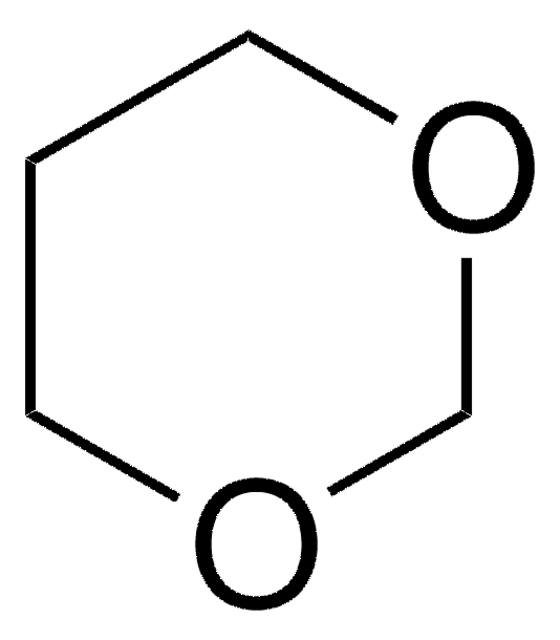676934
1,4-Dioxane
ACS reagent, ≥99.0%
Synonym(s):
Diethylene oxide, Dioxane
About This Item
40 mmHg ( 25 °C)
Recommended Products
grade
ACS reagent
Quality Level
vapor density
3 (vs air)
vapor pressure
27 mmHg ( 20 °C)
40 mmHg ( 25 °C)
Assay
≥99.0%
form
liquid
autoignition temp.
356 °F
expl. lim.
22 %
technique(s)
thin layer chromatography (TLC): suitable
impurities
≤0.0016 meq/g Titr. acid
≤0.005% Peroxide as (H2O2)
≤0.01% Carbonyl (as HCHO)
≤0.05% water
evapn. residue
≤0.005%
color
APHA: ≤20
refractive index
n20/D 1.422 (lit.)
pH
6.0-8 (20 °C, 500 g/L)
bp
100-102 °C (lit.)
mp
10-12 °C (lit.)
transition temp
freezing point ≥11.0
density
1.034 g/mL at 25 °C (lit.)
SMILES string
C1COCCO1
InChI
1S/C4H8O2/c1-2-6-4-3-5-1/h1-4H2
InChI key
RYHBNJHYFVUHQT-UHFFFAOYSA-N
Looking for similar products? Visit Product Comparison Guide
Related Categories
General description
Application
Signal Word
Danger
Hazard Statements
Precautionary Statements
Hazard Classifications
Carc. 1B - Eye Irrit. 2 - Flam. Liq. 2 - STOT SE 3
Target Organs
Respiratory system
Supplementary Hazards
Storage Class Code
3 - Flammable liquids
WGK
WGK 3
Flash Point(F)
51.8 °F - closed cup
Flash Point(C)
11 °C - closed cup
Choose from one of the most recent versions:
Already Own This Product?
Find documentation for the products that you have recently purchased in the Document Library.
Customers Also Viewed
Our team of scientists has experience in all areas of research including Life Science, Material Science, Chemical Synthesis, Chromatography, Analytical and many others.
Contact Technical Service







